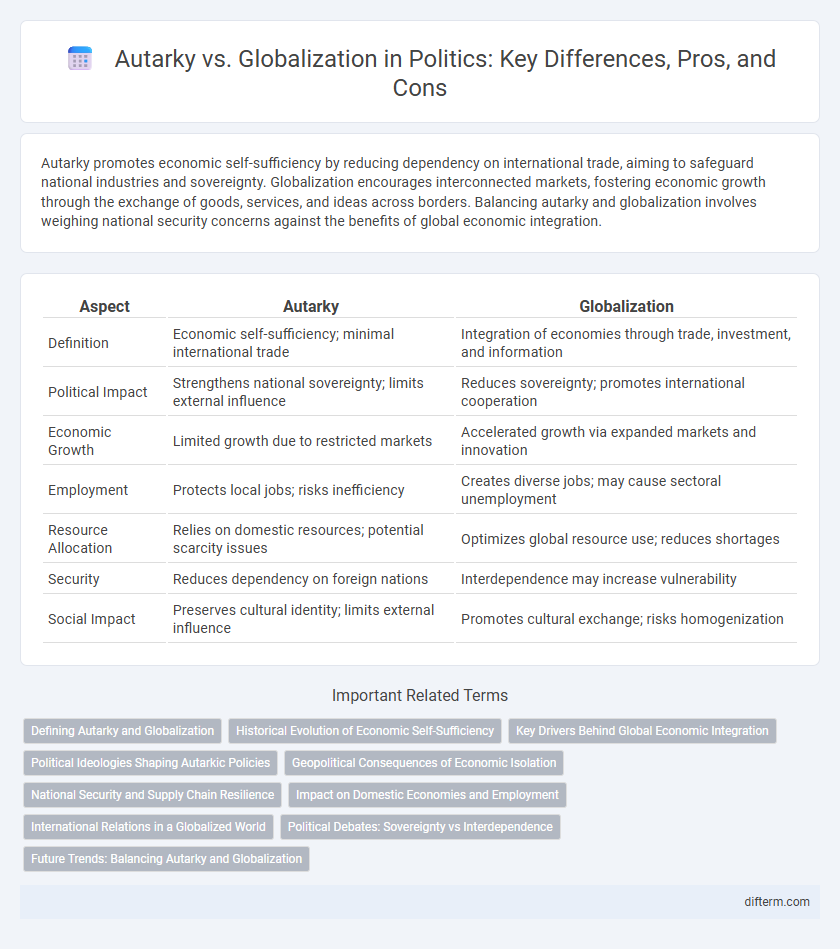Autarky promotes economic self-sufficiency by reducing dependency on international trade, aiming to safeguard national industries and sovereignty. Globalization encourages interconnected markets, fostering economic growth through the exchange of goods, services, and ideas across borders. Balancing autarky and globalization involves weighing national security concerns against the benefits of global economic integration.
Table of Comparison
| Aspect | Autarky | Globalization |
|---|---|---|
| Definition | Economic self-sufficiency; minimal international trade | Integration of economies through trade, investment, and information |
| Political Impact | Strengthens national sovereignty; limits external influence | Reduces sovereignty; promotes international cooperation |
| Economic Growth | Limited growth due to restricted markets | Accelerated growth via expanded markets and innovation |
| Employment | Protects local jobs; risks inefficiency | Creates diverse jobs; may cause sectoral unemployment |
| Resource Allocation | Relies on domestic resources; potential scarcity issues | Optimizes global resource use; reduces shortages |
| Security | Reduces dependency on foreign nations | Interdependence may increase vulnerability |
| Social Impact | Preserves cultural identity; limits external influence | Promotes cultural exchange; risks homogenization |
Defining Autarky and Globalization
Autarky refers to a political and economic system where a country aims for complete self-sufficiency, minimizing foreign dependence by producing all necessary goods and services internally. Globalization is the process of increasing interconnectedness and interdependence among countries through trade, investment, technology, and cultural exchange. While autarky emphasizes national autonomy and controlled economic borders, globalization promotes open markets and cross-border integration.
Historical Evolution of Economic Self-Sufficiency
Economic self-sufficiency, rooted in autarky, traces back to ancient civilizations prioritizing localized production to reduce dependence on external entities during periods of conflict and instability. Throughout history, notable shifts occurred during the interwar period when many nations embraced protectionist policies to shield domestic industries from global economic shocks, reevaluating the balance between self-reliance and international trade. The post-World War II era marked a gradual transition toward globalization, driven by institutions like the International Monetary Fund and the World Trade Organization, which encouraged economic integration while still acknowledging the strategic importance of certain self-sufficient sectors.
Key Drivers Behind Global Economic Integration
Trade liberalization, technological advancement, and multinational corporations serve as key drivers behind global economic integration. Reduced tariffs and improved communication networks enable countries to specialize and exchange goods efficiently on a global scale. Cross-border investment flows and international supply chains further strengthen economic interdependence among nations.
Political Ideologies Shaping Autarkic Policies
Political ideologies such as nationalism and protectionism heavily influence autarkic policies by prioritizing self-sufficiency and economic independence over international trade. Right-wing populist movements often promote autarky to safeguard domestic industries and reduce reliance on foreign economies, framing globalization as a threat to national sovereignty. Conversely, socialist ideologies may endorse autarky to control resources and production within borders, aiming to shield the economy from global capitalist fluctuations.
Geopolitical Consequences of Economic Isolation
Economic isolation through autarky leads to increased geopolitical tensions as states compete for limited resources and strategic alliances become strained. Reduced trade flows weaken interdependence, diminishing diplomatic leverage and escalating the potential for conflicts. Globalization, conversely, fosters cooperation and stability by creating interconnected markets that encourage peaceful resolution of disputes.
National Security and Supply Chain Resilience
Autarky strengthens national security by reducing dependence on foreign supply chains, thus minimizing vulnerabilities to international disruptions and geopolitical conflicts. Globalization enhances supply chain resilience through diversified sourcing and international cooperation but increases exposure to external shocks and political risks. Balancing autarky and globalization is crucial for optimizing national security while maintaining economic stability and supply chain efficiency.
Impact on Domestic Economies and Employment
Autarky policies aim to reduce dependency on international trade by promoting self-sufficiency, which can protect domestic industries but often lead to inefficiencies and higher consumer costs. Globalization fosters economic integration, expanding markets and creating jobs in export-oriented sectors while increasing competition that may displace workers in less competitive industries. Balancing autarky's protection of local employment against globalization's growth opportunities remains a critical challenge for policymakers managing domestic economic stability.
International Relations in a Globalized World
Autarky emphasizes national self-sufficiency, reducing reliance on international trade to protect domestic industries and political sovereignty. Globalization fosters interdependence among states through economic integration, diplomatic partnerships, and multilateral institutions, enhancing cooperation but also increasing vulnerability to global shocks. In international relations, balancing autarkic tendencies and global interconnectedness shapes national strategies for security, economic growth, and diplomatic influence.
Political Debates: Sovereignty vs Interdependence
Political debates around autarky prioritize national sovereignty, emphasizing self-reliance to protect domestic industries and maintain control over resources without external influence. Conversely, globalization advocates highlight the benefits of interdependence, promoting cooperative international relations and economic integration to leverage comparative advantages and shared innovation. These opposing views reflect fundamental tensions between protecting state autonomy and embracing global connectivity for economic growth.
Future Trends: Balancing Autarky and Globalization
Emerging geopolitical shifts and technological advancements shape the future trend of balancing autarky and globalization, where nations seek strategic self-sufficiency while maintaining global trade interdependencies. Investment in digital infrastructure and renewable energy fosters resilient domestic economies, reducing vulnerability to international supply chain disruptions. Policy frameworks emphasize adaptive economic models integrating localized production with selective global partnerships, reflecting a hybrid approach to national security and economic growth.
Autarky vs Globalization Infographic

 difterm.com
difterm.com